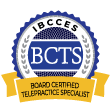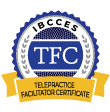Telepractice certification that helps you quickly transition to the virtual delivery of services for your students.
The online delivery of services to individuals and students with special needs has become a necessity for all therapists and service providers. Schools and districts still need to provide for students with special needs, whether students are able to attend school in person or not. To ensure telepractice is easy to implement, meets requirements, and is administered professionally and effectively, standardized learning for practitioners is a must.
IBCCES offers several certification programs that give telepractitioners the tools they need to be highly successful when delivering virtual services. Communicating online has its own rules and protocols and requires therapists, special educators and facilitators to learn new skill sets to be successful when delivering services online.
Key benefits to our training and certification are that it is based on industry best practices and is platform agnostic, meaning you can use the skills and techniques across multiple teletherapy or conferencing platforms.







 Requirements:
Requirements: Requirements:
Requirements:









